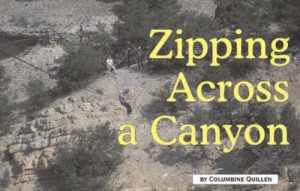Article by Sue Snively
Politics – September 2006 – Colorado Central Magazine
THEIR NAMES ARE MARMALADE AND JIGGS, and they are very close. They may be seen sleeping in their cage with their front legs wrapped around each other. When together they are secure and content.
Marmalade and Jiggs are two adult cats that have been housed at the Ark Valley Humane Society, Inc. (AVHS) for almost a year. They were leftovers from a full group of kittens, but because they were the least tame of the group, they didn’t get adopted. And now, even though they’re no longer wild, no one wants them. They’re not “the cute little kittens” that are so easy to place. But they are beautiful animals that would make wonderful pets if placed in a loving home.
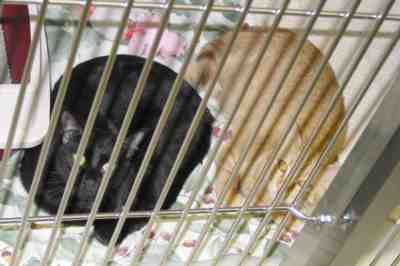
AVHS has a long history of finding homes for animals like Marmalade and Jiggs. They advertise animal availability through the local papers and on their website www.ark-valley.org, and they’re also aligned with the websites: 1-800-save-a-pet.com; Petfinder.com; and Hugs for Homeless Animals at www.h4ha.org.
Michele Wayland, the shelter director, says, “We place our animals with care, attempting to match the pet with the proper owner, taking into account the lifestyles of both.” In 2005 the shelter received 534 animals, 70% of which were dogs and 30% cats. The animals were either surrendered by owners who could not keep them, lost pets, or strays picked up by local law enforcement officers.
Of those 534 animals, 184 were eventually reclaimed by their owners and 267 were adopted out. The Shelter strives to be a “No Kill” shelter, but hopelessly vicious animals, terminally ill animals, and those in acute pain are humanely euthanized. Every effort is made to adopt animals out, but if an animal is not adopted or claimed by its owner, it is loved and cared for by the expert staff and many volunteers (there were 180 in 2005) at the shelter.
Lexi
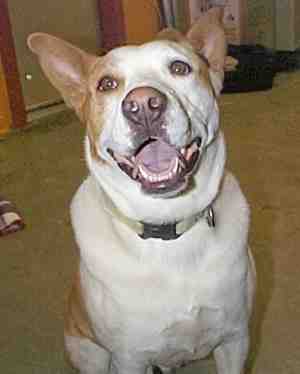
Lexi, a sweet dog who adores people, can attest to that loving care. She was placed in a home with people who adored her, but managed to break the latch on a window and escape. She got in a fight with a neighbor’s dog and her owners surrendered her back to the shelter. She has suffered from separation anxiety (a trait common in dogs that have left the litter too soon or been separated from their owners), but Lexi is overcoming that anxiety and would love to find a home with owners who would love and care for her. Until that happens, she will be — along with the many other animals at the shelter — the object of affection from the staff and the volunteers who come to feed her, walk her, clean her cage, and give her the affection she deserves.
A Clean and Kindly Place
Unlike some shelters I have visited, the Ark Valley Humane Society is a wonderful place. The dogs have their own clean kennels outside and are moved in at night. There is an area where the many volunteers can exercise, walk and play with the dogs. Inside the shelter, the south side is for dogs and the north for cats. The cats have their own kennels plus a play room where they can have their freedom to enjoy themselves and spend time with each other and/or the staff and volunteers. There is a clean and cheery isolation area where the pets are held upon entering the facility until they can be checked out for any physical or emotional difficulties they may have.
There’s also a building that houses a crematory. I remember bringing our own sweet Caesar, a mixture of St. Bernard, Newfoundland and Great Pyrenees who was as big as he was sweet, to the crematory after he died several years ago. The staff was kind and understanding and really helped me through the grief of losing my pet.
History of the Shelter
Why is the Ark Valley Humane Society’s Shelter so important to the people and animals in Chaffee County?
Fifteen years ago, there was no shelter. Local resident Ron Southard remembers, “At that time Buena Vista’s answer to a shelter for wayward animals was little more than a few sheets of plywood leaning against another building, barely providing protection from rain or snow, let alone any creature comforts. The conditions were truly brutal, and euthanasia was generally implemented after a few days.”
Mountain Shadows Animal Hospital in Salida kept a few animals as long as space permitted, but they could only do so much.
So in 1991 a group of volunteers, Southard among them, formed a non-profit named Ark Valley Humane Society, Inc. with funding that was dependent on grants and donations. They had fundraisers of many kinds including bake sales, yard sales and at one point they even raffled a motorcycle.
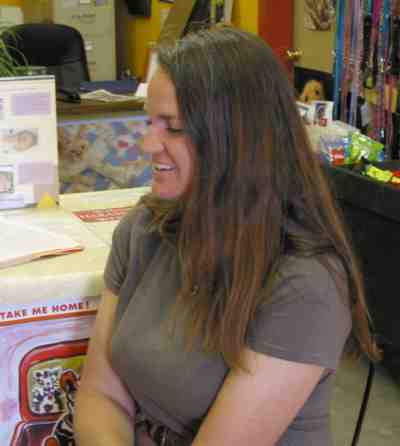
In 1992, the town of Buena Vista donated two acres of land at the present location. Ground-breaking for the shelter occurred and construction started shortly thereafter. Much of the construction was done by the inmates from the correctional facility.
With the help of donated time and materials, the shelter was able to open its doors in 1995 and they have not been closed since, although a year ago they came within a month of shutting down, due to lack of enough funds to continue the day-to-day operation. Services had to be drastically cut just to keep going. The spirit of the community, however, came through with enough money garnered through fundraisers and donations to continue the full scale operation.
Proposed Mill Levy for Secure Funding
This brings us to the proposed mill levy that will be on the ballot in November. If passed, it will bring in a constant and secure source of income to fund the day-to-day operation of the shelter. In 2005 it cost $161,000 to operate the shelter, $58,000 of it taken in as income and the rest gleaned from donations and fundraisers. If the 1/2 mill levy on property taxes is passed it will bring in approximately $148,600 annually.
What does this mill levy mean to the average property owner? For every $100,000 of the assessed value of a home, it will mean an added $3.98 a year on the property tax bill. For a home valued at $150,000 that would be $5.97 per year, $200,000 would be $7.96 a year, and on up as the value increases — and that seems like a very small price to pay for the safety and security of the animals in this county.
The Society’s director, Michele Wayland, feels the shelter is in need of expansion because the human population is growing, and along with it, the animal population. Right now the shelter is designed for 24 dogs and 14 cats; it’s full 75% of the time and is often forced to go over-capacity, housing as many as 60 or more animals.
The mill levy funds will be used strictly for operating cost, but having them may free up enough of the money coming from donations and fundraising for an expansion. One idea under consideration is opening a facility in the southern end of the county. The shelter now works with Mountain Shadows Animal Hospital west of Salida to help their small holding facility with overflow. If the mill levy passes AVHS and Mountain Shadows will continue to cooperate in terms of funding and care of animals and will look into the possibility of someday expanding into a southern facility.
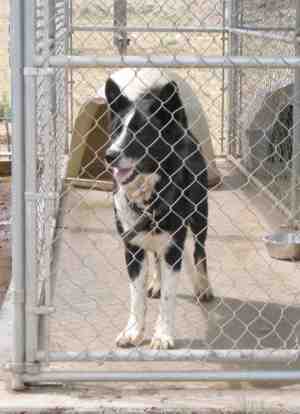
Michele also foresees the possibility of opening an animal boarding facility for residents of the county to use. This would not only be self-supporting, it could earn revenue for the humane society, and might even offer employment opportunities for the residents of the county. The boarding facility is still in the dream stage, but the shelter already offers numerous services, including a spay and neutering program; the pet placement program which includes the use of donated money for residents who want a pet but can’t afford the adoption fee; an information resource about pets for the residents; and a DVD about dog training.
Availability of Information about the Shelter
AVHS always welcomes visitors to the Shelter and to the Society’s Board Meetings, and the shelter’s financial and operating information is available. To contact the shelter call 719-395-2737; or e-mail avhs@ amigo.net.
Save our Shelter is a committee headed by Conrad Nelson and Diane Alexander. Their website offers information about the election for the mill levy at www.SaveOurShelter.org or you can contact Conrad at 719-395-3470 or cwn@rockymountains.net and Diane at 719-395-9123 or dalex@amigo.net.
Sue Snively, who in general tolerates animals better than people, lives and writes in Buena Vista with her two dogs, two cats, and husband, Frank.


